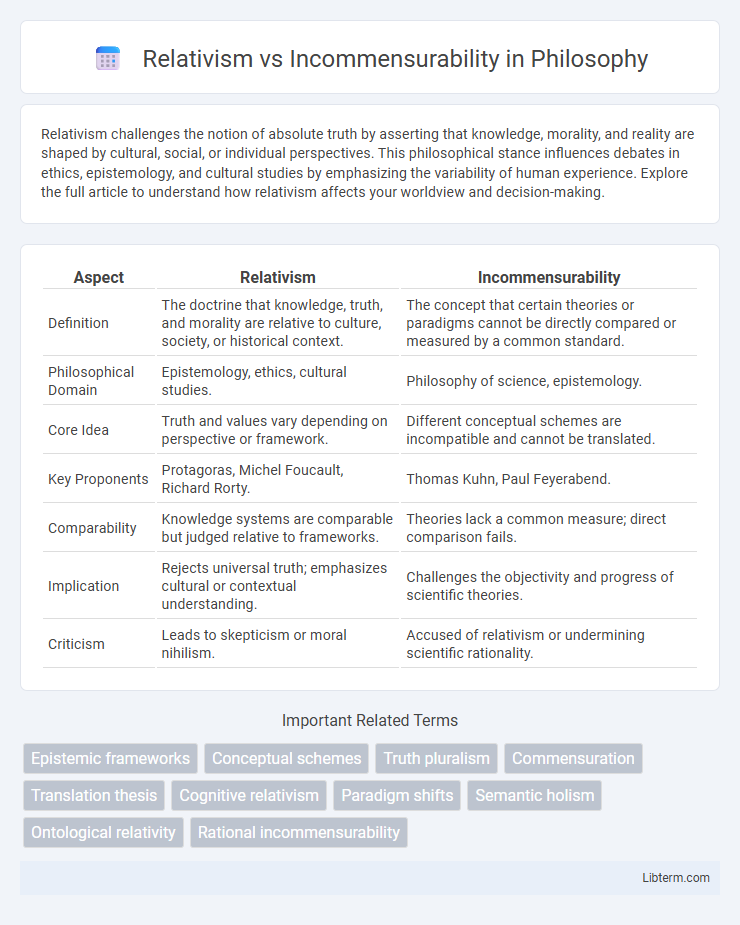Relativism challenges the notion of absolute truth by asserting that knowledge, morality, and reality are shaped by cultural, social, or individual perspectives. This philosophical stance influences debates in ethics, epistemology, and cultural studies by emphasizing the variability of human experience. Explore the full article to understand how relativism affects your worldview and decision-making.
Table of Comparison
| Aspect | Relativism | Incommensurability |
|---|---|---|
| Definition | The doctrine that knowledge, truth, and morality are relative to culture, society, or historical context. | The concept that certain theories or paradigms cannot be directly compared or measured by a common standard. |
| Philosophical Domain | Epistemology, ethics, cultural studies. | Philosophy of science, epistemology. |
| Core Idea | Truth and values vary depending on perspective or framework. | Different conceptual schemes are incompatible and cannot be translated. |
| Key Proponents | Protagoras, Michel Foucault, Richard Rorty. | Thomas Kuhn, Paul Feyerabend. |
| Comparability | Knowledge systems are comparable but judged relative to frameworks. | Theories lack a common measure; direct comparison fails. |
| Implication | Rejects universal truth; emphasizes cultural or contextual understanding. | Challenges the objectivity and progress of scientific theories. |
| Criticism | Leads to skepticism or moral nihilism. | Accused of relativism or undermining scientific rationality. |
Understanding Relativism: Core Concepts
Relativism posits that truth and moral values are not absolute but contingent upon cultural, historical, or personal perspectives, emphasizing the variability of knowledge frameworks. Core concepts include epistemic relativism, which challenges universal standards of truth by asserting that different communities possess distinct criteria for justification. This understanding highlights the fluidity of meaning and ethics across diverse contexts, underscoring the importance of situational interpretation in philosophical discourse.
Defining Incommensurability in Philosophy
Incommensurability in philosophy refers to the concept that certain theories or paradigms are so fundamentally different in terms of language, concepts, or standards that they cannot be directly compared or measured against each other. This notion challenges the idea that there is a neutral or common framework for evaluating competing scientific theories or worldviews. Philosophers like Thomas Kuhn and Paul Feyerabend emphasize incommensurability as a barrier to objective comparison, highlighting the role of linguistic and conceptual frameworks in shaping understanding.
Historical Background of Relativism and Incommensurability
Relativism emerged prominently in the 20th century through philosophers like Friedrich Nietzsche and later in anthropology and cultural studies, emphasizing the idea that knowledge and truth are context-dependent and vary across cultures. Incommensurability, introduced by Thomas Kuhn in the philosophy of science, highlights the inability to compare different scientific paradigms due to fundamental differences in concepts and methodologies. Both concepts challenge absolute standards of truth, marking a pivotal shift from classical universalism to a more pluralistic understanding of knowledge.
Key Differences Between Relativism and Incommensurability
Relativism posits that truth and morality are contingent on cultural or individual perspectives, implying no absolute standards across contexts. Incommensurability refers to the notion that certain concepts, theories, or value systems cannot be directly compared due to differing foundational premises or criteria. The key difference lies in relativism's emphasis on variability of truth, while incommensurability highlights the impossibility of meaningful comparison between fundamentally distinct frameworks.
Relativism in Ethics, Science, and Culture
Relativism in ethics asserts that moral principles are not universally valid but instead depend on cultural, social, or individual contexts, challenging the existence of absolute moral truths. In science, relativism highlights how scientific theories and paradigms are influenced by historical and cultural factors, suggesting that scientific knowledge is contingent rather than objective. Cultural relativism emphasizes understanding beliefs and practices within their own cultural framework, rejecting ethnocentric judgments and promoting tolerance of diverse worldviews.
Incommensurability in Scientific Paradigms
Incommensurability in scientific paradigms refers to the idea that competing frameworks or theories are often so fundamentally different in concepts, methods, and standards that they cannot be directly compared or measured against each other. This concept, introduced by Thomas Kuhn, challenges the possibility of a neutral standpoint to evaluate scientific progress, as paradigms operate within distinct conceptual schemes. Incommensurability emphasizes that paradigm shifts involve not just a change in theories but a transformation in the underlying worldview, making scientific knowledge partly non-translatable across paradigms.
Arguments Supporting Relativism
Relativism argues that truth and moral values are not absolute but depend on cultural, historical, or individual perspectives, emphasizing the variability of human experience. It posits that different belief systems or cultural frameworks are equally valid, challenging universal standards and fostering tolerance and understanding. This position is supported by ethnographic evidence demonstrating diverse worldviews and moral practices that resist objective comparison.
Critiques of Incommensurability
Critiques of incommensurability highlight its challenge to objective comparison by arguing that it leads to relativism, where distinct paradigms lack common standards for evaluation. Philosophers like Thomas Kuhn and Paul Feyerabend have faced criticism for endorsing incommensurability, which some claim undermines scientific rationality and progress. Critics emphasize the possibility of partial translation and shared aspects across paradigms to counter the absolute barrier in understanding posited by incommensurability.
Practical Implications for Knowledge and Communication
Relativism, which posits that truth and knowledge are context-dependent, challenges the universality of objective standards, while incommensurability underscores the impossibility of direct comparison between fundamentally different conceptual frameworks. These distinctions critically impact cross-cultural dialogue and interdisciplinary research, as communication requires recognizing varying epistemic norms without assuming shared reference points. Practical implications include the necessity for adaptive interpretive strategies and the avoidance of imposing one framework's criteria upon another, fostering mutual understanding despite epistemic diversity.
Relativism vs Incommensurability: Contemporary Debates
Relativism and incommensurability are central in contemporary debates on epistemology and cultural philosophy, where relativism posits that truth and moral values are culture-specific and context-dependent, opposing universalist claims. Incommensurability highlights the challenge of comparing or translating concepts across radically different paradigms or linguistic frameworks, suggesting that some knowledge systems are fundamentally incompatible. Current discussions explore whether incommensurability undermines relativism by exposing limits to comparative understanding or reinforces it by confirming the irreconcilability of diverse epistemic systems.
Relativism Infographic

 libterm.com
libterm.com